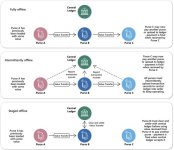Brussels, 31 August, 2023 – Swift today released results from a new series of experiments that show its infrastructure can seamlessly facilitate the transfer of tokenised value across multiple public and private blockchains. The findings have potential to remove significant friction slowing the growth of tokenised asset markets and enable them to scale globally as they mature.
While tokenisation is in its infancy, 97% of institutional investors believe it will revolutionise asset management and be a positive force in the industry[1], not least because of its potential to increase efficiency, reduce costs and, by enabling fractional ownership, open up opportunities to more investors.
One issue challenging investors and institutions, however, is that tokenised assets are managed on different blockchains, each with its own functionality and liquidity profile. Interoperability between these blockchains is crucial, otherwise financial institutions must build connections to each platform, creating significant operational challenges and cost.
Working with more than a dozen major financial institutions and market infrastructures and Chainlink, a leading Web3 services platform, Swift has successfully demonstrated that it can provide a single point of access to multiple networks using existing, secure infrastructure, thereby significantly reducing operational challenges and investment required for institutions to support the development of tokenised assets.
The experiments are part of Swift’s wider strategy to ensure secure, global interoperability as new technologies and platforms emerge. They build on work over the past few years to show how Swift infrastructure could support the financial community in interconnecting Central Bank Digital Currencies (CBDCs) and other digital assets with new and existing payments systems.
Tom Zschach, Chief Innovation Officer at Swift, said: “Interoperability is at the heart of everything we are doing at Swift to facilitate the seamless flow of value across the world in the face of increasing fragmentation. For tokenisation to reach its potential, institutions will need to be able to seamlessly connect with the whole financial ecosystem. Our experiments have demonstrated clearly that existing secure and trusted Swift infrastructure can provide that central point of connectivity, removing a huge hurdle in the development of tokenisation and unlocking its potential.”
About the experiments
Swift collaborated with several major financial institutions on the experiments, including Australia and New Zealand Banking Group Limited (ANZ), BNP Paribas, BNY Mellon, Citi, Clearstream, Euroclear, Lloyds Banking Group, SIX Digital Exchange (SDX) and The Depository Trust & Clearing Corporation. Chainlink was used as an enterprise abstraction layer to securely connect the Swift network to the Ethereum Sepolia network, while Chainlink’s Cross-Chain Interoperability Protocol (CCIP) enabled complete interoperability between the source and destination blockchains.
In addition to demonstrating that existing Swift infrastructure can provide a secure, scalable way for financial institutions to connect to multiple types of blockchain, they advanced understanding around the technical and business requirements for interacting with business and public blockchains. The experiments also explored the value of a blockchain interoperability protocol for securely transferring data between existing systems and a potentially unlimited number of blockchains.
The experiments looked at the design and technical development of a solution and considerations around data privacy and governance, operational risk, and legal liability. Transfers of simulated tokenised assets took place – between two wallets on the same public Distributed Ledger Technology network; between two wallets on different public blockchains; and between a public and private blockchain network.
Swift will continue to work with the financial community to understand the most concrete use cases for tokenised asset adoption and will prioritise its efforts accordingly. It is anticipated that the most compelling case, in the near term, will be in the secondary trading of non-listed assets and private markets.
The full report can be found here.
Swift

www.swift.com





















